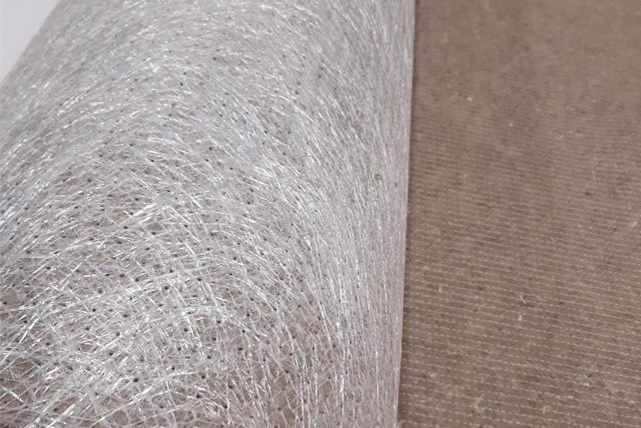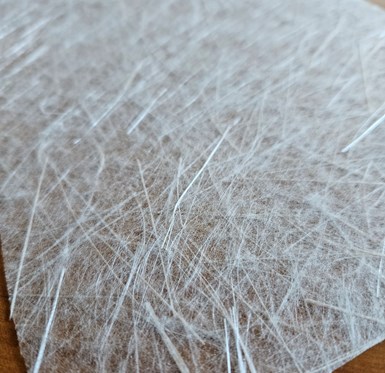JEC World 2023 preview: Chomarat
Chomarat Group emphasizes R&D work in recycling, hybrid glass/hemp fiber mats, and sustainability-focused initiatives with startup partners.

At JEC World 2023, Chomarat (Le Cheylard, France) is emphasizing its committment to eco-design, featuring work in recycling and natural fibers. Three start-up companies are also featured at Chomarat’s booth (Hall 5, Stand J42).
Recycling R&D work
As part of its eco-design strategy, Chomarat has set the goal of actively participating in reducing the environmental footprint of composites. The group is particularly involved in research work on the recycling of glass and carbon fibers. As part of its ReMat project, for example, the company is working on reducing its own production waste.

Recycled mat.
“The recycling of the glass fibers from our waste and their use in our reinforcements are being assessed, there are many technical obstacles and we must also assess the interest of these products on the market,” explains Philippe Sanial, R&D director at Chomarat. “The next step in our longer-term research work will be to introduce recycled glass fibers from end-of-life composite parts into our manufacturing processes. These fibers come from the recycling channel of our developer partner Composites Recycling.”
Hybrid glass/hemp fiber reinforcement
In addition, Chomarat continues its work on the integration of natural fibers in its range.
A finalist for a JEC Innovation Award, Chomarat worked with Beneteau Group to develop a reinforcement combining glass and hemp fibers. The solution developed is said to meet the technical expectations of customers in terms of deformability and homogeneity. The Beneteau Group’s objective is to replace 15 tons of glass mat per year with hemp for the manufacture of small composite parts that equip its boat decks.
At JEC, Chomarat, the Beneteau Group and Arkema will present on the theme of sustainable composites in the natural industry on Thursday, April 27 at 11:30 a.m. in Agora 5.
Focus on startups
Chomarat is highlighting three startups it has collaborated with within its booth:
- Solar Cloth manufactures lightweight, flexible, custom-made solar panels for installation where other panels are not a viable option such as on textiles, vehicles, or lightweight structural buildings.
- MCVE has developed a process for additive printing of electrical circuits on glass fabrics or natural fiber fabrics allowing the functionalization of composite materials.
- Composite Recycling has designed a very energy-efficient end-of-life composite parts treatment solution that separates the resin from the fibers. These can then be reused to make new composites in an economically viable way.
“Relying on partnerships to innovate is part of our DNA. We are delighted to collaborate with innovative companies to offer new solutions to our customers and to contribute to the emergence of a new generation of composite materials” says Philippe Chomarat, commercial director at Chomarat.
Related Content
-
Melker of Sweden accomplishes sea kayak with 100% sustainable composite construction
Built with ampliTex flax fabrics, a solid cork core and Sicomin plant-based resins, the company’s Värmdö kayak model highlights an environmentally conscious design for paddlers of all levels.
-
Bio-based SiC ceramics from wood polymer composites
Austrian research institute Wood K plus makes 95% silicon carbide ceramics more sustainable (>85% bio/recycled content), enables 3D shapes via extrusion, injection molding and 3D printing.
-
Sulapac introduces Sulapac Flow 1.7 to replace PLA, ABS and PP in FDM, FGF
Available as filament and granules for extrusion, new wood composite matches properties yet is compostable, eliminates microplastics and reduces carbon footprint.
.jpg;width=70;height=70;mode=crop)





